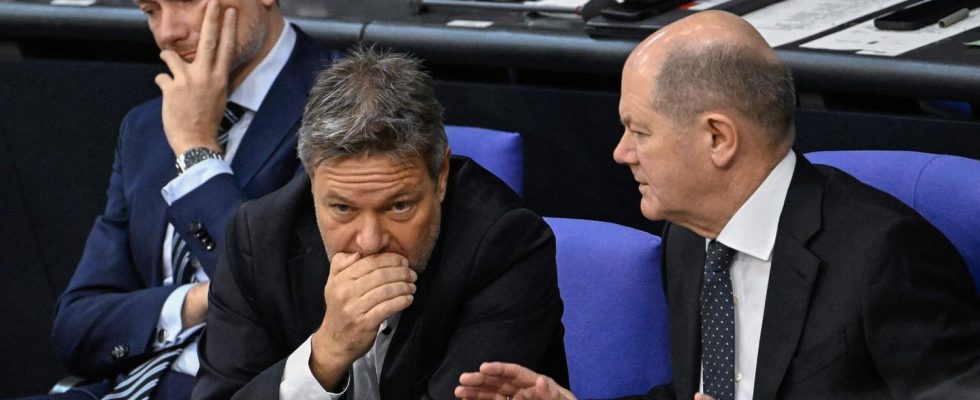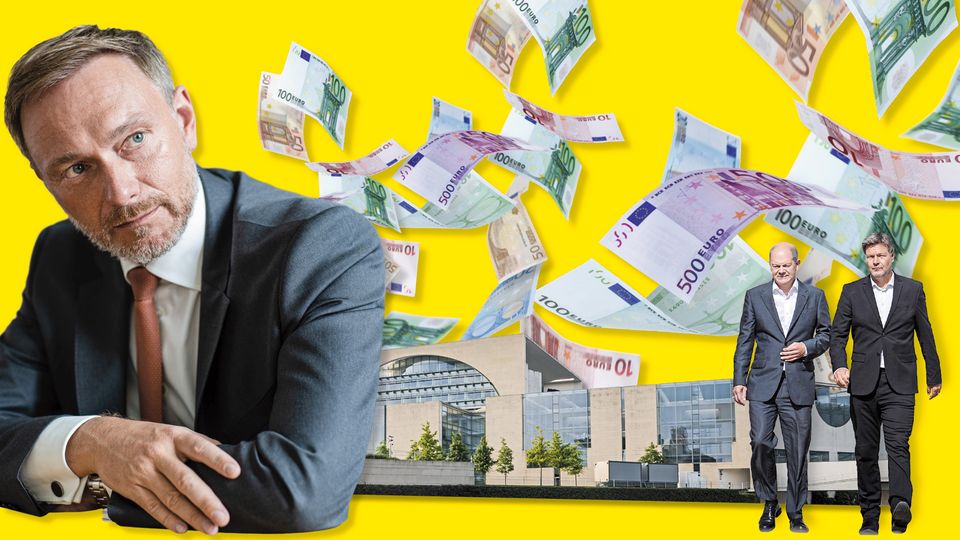17 billion euros are missing
Dispute over the 2024 budget gap: traffic light meeting ends without a solution
No solution in sight in the debate about the 2024 budget gap. Federal Finance Minister Christian Lindner, Economics Minister Robert Habeck and Chancellor Olaf Schulz at the budget debate in the Bundestag. A traffic light meeting on Wednesday evening was unsuccessful.
© Tobias Schwarz / AFP
According to Finance Minister Christian Lindner, 17 billion euros are missing from the budget for the coming year. At a meeting, the traffic light coalition struggled for a way out – so far without a solution.
“Who hid the recipe?” sang Children on Wednesday for Olaf Scholz at the handover of the Christmas tree in the Chancellery. The traffic light’s “Christmas bakery” will have to bake smaller rolls in 2024 due to the budget crisis. There is no recipe for it yet.
The meeting of the leaders of the three partners SPD, Greens and FDP on Wednesday evening ended after an hour and a half, as expected, without results. But it was said that there was a good political exchange. Federal Finance Minister Christian Lindner (FDP) had previously spoken on ZDF of a gap of 17 billion euros in the budget for 2024, for which he saw a “need for action”.
It is still open and controversial how the government will be able to spend money in the coming year. The Federal Constitutional Court had declared the reallocation of 60 billion euros in the 2021 budget to the climate and transformation fund to be null and void. The money was approved as a Corona loan, but was subsequently intended to be used through the fund for climate protection and the modernization of the economy. At the same time, the judges decided that the state was not allowed to set aside emergency loans for later years. But that’s exactly what the federal government has done in special funds, among other things, to curb energy prices – which is now tearing additional holes in the budget.
Christian Lindner after the Karlsruhe verdict: “The state is fully capable of acting”
A decision must now be made quickly and carefully, said Lindner. “But the state is fully capable of acting.” What must be achieved is that the money that is available is handled more accurately.
On behalf of the Union, the parliamentary group’s parliamentary manager, Thorsten Frei (CDU), warned the traffic light coalition against suspending the debt brake again next year. There is “no reasonable reason for this so far,” Frei told the “Stuttgarter Zeitung” and the “Stuttgarter Nachrichten” (Thursday).
Lindner had previously made a similar statement: The finance minister said on ZDF that he was “not yet convinced” that the conditions for an emergency resolution would be met in 2024. This year, the traffic light coalition agreed to suspend the debt brake again due to an emergency situation and to launch a supplementary budget. The Bundestag still has to decide on this.
SPD leader Klingbeil against social cuts in the federal budget
Meanwhile, SPD leader Lars Klingbeil rejected the Union’s demands for significant social cuts to close the billion-dollar hole in the 2024 federal budget. “We have to keep the welfare state strong because it gives people security, especially in times of uncertainty,” he said in an interview with the German Press Agency. “And that’s why the ax can’t be used there.” Klingbeil emphasized that he was also prepared to talk pragmatically and non-ideologically about savings potential. For him, however, it is important to maintain investments in Germany’s economic performance.
CDU leader Friedrich Merz had, among other things, called for basic child welfare and higher citizens’ benefits to be dispensed with in order to close the budget gap.
On the question of whether the debt brake would need to be reformed in view of investment pressure and the Karlsruhe ruling, Union budget expert Mathias Middelberg (CDU) expressed understanding for the attitude of some CDU-led countries. Middelberg told the “Rheinische Post” (Thursday): “The debt brake is significantly stricter for the states than for the federal government.” At least for the federal government, he sees no need for change.
103 images
On Tuesday in the Bundestag, CDU party leader Merz, although not by name, clearly reprimanded his party colleague, Berlin’s governing mayor Kai Wegner, because he had repeatedly spoken out in favor of reforming the debt brake. Merz rejects this. However, the traffic light would depend on the votes of the Union in the Bundestag.


